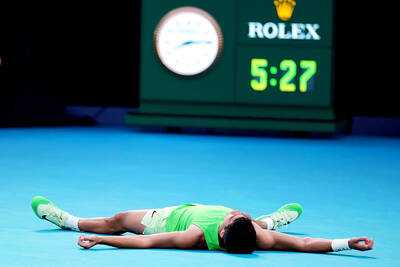It might be two decades since the Hansie Cronje corruption scandal rocked cricket, but even now the ripples are still being felt.
This month marks the 20th anniversary of Cronje being stripped of the South Africa captaincy following an extraordinary sequence of events earlier in 2000.
In January, come the last day of a “dead” Test against England (South Africa had already won the series), a draw seemed inevitable after rain had washed out three days.
Yet Cronje contrived a positive result by getting England captain Nasser Hussain to agree that both sides would forfeit an innings.
England were left with a target of 249 for victory after Cronje declared and eventually won by two wickets.
Traditionalists were aghast at the interference with the “proper” course of a Test, yet few were prepared for what was to come.
In April, Cronje’s image as a religious sportsman — he wore a bracelet inscribed with the words “What Would Jesus Do?” — was shattered for all time.
An Agence France-Presse (AFP) report, later confirmed by New Delhi police, said that the force had telephone recordings of Cronje and an Indian bookmaker discussing predetermined Proteas performances during the tour of India the previous month.
Such was Cronje’s standing at home and abroad, the initial reaction was one of “shock and disbelief.”
It was a sentiment shared by Ali Bacher, managing director of the United Cricket Board, the forerunner of Cricket South Africa.
“When AFP broke the story before the official press conference by the Delhi police, I remember the office receiving a call from Dr Bacher blasting the agency for ruining the reputation of one of South Africa’s most iconic personalities,” said Kuldip Lal, the Delhi-based cricket reporter behind the scoop.
“He threatened to sue us. I thought to myself that if the story is incorrect, a few of us may need to look for another job,” Lal added.
However, Cronje’s partial confession a few days later led to a “feeling of relief” in AFP’s Delhi bureau.
“To his credit, Dr Bacher called the office to apologize for his earlier outburst,” Lal said.
Cronje later confessed to several allegations at the South African government-appointed King Commission, including attempts to bribe Herschelle Gibbs and Henry Williams to underperform in a one-day international against India.
He also admitted to receiving hundreds of thousands of US dollars from bookmakers to prearrange certain conditions — cricket’s complexity means gambling coups are possible without “fixing” the result — with his Centurion effort netting him about US$6,000 and a leather jacket.
Cronje, who insisted that he had never thrown a game, was later given a life ban from cricket, yet his reputation remained high with both his former teammates and the South African public.
Batsman Daryll Cullinan testified that Cronje, who died in a 2002 plane crash, had offered the team US$250,000 to throw a match, before adding that he still thought of him “as a great captain and a great leader.”
Meanwhile, separate national hearings and investigations led to life bans for Pakistan’s Saleem Malik and India’s Mohammad Azharuddin.
Yet their suspensions were among several punishments subsequently overturned, although for Malik and Azharuddin the initial sanctions effectively ended the careers of two world-class batsmen.
The International Cricket Council responded by creating a new anti-corruption unit led by Paul Condon, former head of London’s Metropolitan Police.
However, it was desperately understaffed and 10 years ago it was Britain’s News of the World that exposed the willingness of Pakistan captain Salman Butt, and bowlers Mohammad Asif and Mohammad Amir, to engage in spot-fixing.
Since then a beefed-up unit, respected for its work in educating players about the dangers of corruption, has had a greater impact, with its investigations leading to New Zealand batsman Lou Vincent receiving a life ban for match-fixing in 2014.
However, the rise of Twenty20 franchise leagues and the development of the sport have created new targets for fixers.
As has happened in tennis, they can now turn their attention to less high-profile areas of the game, where the financial rewards for players are far less and the temptation to cheat potentially all the greater.
One constant, though, is that betting on cricket in India, the sport’s biggest market, is illegal, meaning there is no formal regulation, even though gambling on horse racing is not.

Nottingham Forest FC are to go into the Europa League play-off round after a 4-0 win over Ferencvaros TC on Thursday, while Celtic FC secured their place in the knockout phase with a victory over FC Utrecht. Aston Villa FC finished second in the league phase after recovering from two goals down to beat FC Red Bull Salzburg 3-2 with their spot in the last 16 already assured. Forest stood an outside chance of climbing into the top eight going into the final round of matches, but needed to beat Robbie Keane’s Ferencvaros and rely on other results going their way. Sean Dyche’s

HEATED RIVALRY: The pair had met 14 times previously, with Sabalenka winning eight of the encounters and entering the final as the favorite to take the title Elena Rybakina took revenge over world No. 1 Aryna Sabalenka to win a nail-biting Australian Open final yesterday and clinch her second Grand Slam title. The big-serving Kazakh fifth seed held her nerve to pull through 6-4, 4-6, 6-4 at Rod Laver Arena in Melbourne in 2 hours, 18 minutes. It was payback after the Belarusian Sabalenka won the 2023 final between two of the hardest hitters in women’s tennis. The ice-cool Rybakina, 26, who was born in Moscow, adds her Melbourne triumph to her Wimbledon win in 2022. It was more disappointment in a major final for Sabalenka, who won the US Open

Denver superstar Nikola Jokic returned from a 16-game injury absence to post a 31-point, 12-rebound double-double on Friday and propel the Nuggets to a 122-109 NBA victory over the Los Angeles Clippers. Three-time NBA Most Valuable Player Jokic had not played since suffering a bone bruise in the left knee he hyperextended in a game against Miami on Dec. 29 last year. The Serbian big man did not miss a beat. He led all scorers, connecting on eight of 11 shots from the field, and also handed out five assists with three steals while playing just 24 minutes, 32 seconds as the

BATTERED AND BRUISED: Alcaraz suffered a cramp in the third set, but was allowed treatment despite Zverev’s protests, and continued on to win in five-and-a-half hours An ailing Carlos Alcaraz battled past Alexander Zverev yesterday in five epic sets to reach his first Australian Open final and move within a match of becoming the youngest man to complete a career Grand Slam. The world No. 1 outlasted the German third seed 6-4, 7-6 (7/5), 6-7 (3/7), 6-7 (4/7), 7-5 over a titanic 5 hours, 27 minutes in hot conditions to head to tomorrow’s title match. He only narrowly avoided crashing out after a huge fright at 4-4 in the third set when he pulled up in pain with what appeared to be cramp. He was allowed to have treatment